
"Meditations" by Marcus Aurelius
“Meditations” by Marcus Aurelius is an inspiring work of philosophy and reflection, offering timeless wisdom on how to live a virtuous life. In this collection of personal writings, Marcus Aurelius, the Roman Emperor and Stoic philosopher, explores themes such as resilience, self-discipline, and the importance of living with the nature of the universe. Through his verbal approach, he encourages readers to embrace the present moment, accept life’s inevitable challenges, and cultivate inner tranquility amidst external turmoil. “Meditations” continues to inspire readers seeking guidance on navigating the complexities of existence with wisdom and grace.
Introduction
In the tradition of significant historical figures, not many shine as brightly as Marcus Aurelius, the Roman Emperor and Stoic philosopher whose work “Meditations” continues to inspire and guide millions around the globe. You may wonder who Marcus Aurelius is. Today, we will explore his life, his profound wisdom from Meditations by Marcus Aurelius, and its enduring impact on modern life.
Early Life and Ascension to Power
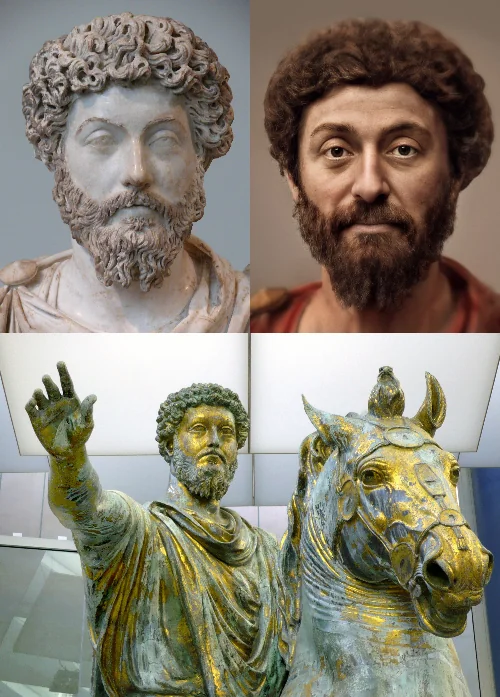
Marcus Aurelius: A Stoic Emperor’s Life
Marcus Aurelius Antoninus, born on April 26, 121 AD, in Rome, is often remembered as a Roman emperor and one of the last Stoic philosophers of the ancient world. His reign, from 161 to 180 AD, marked the tail end of the Pax Romana, a period of relative peace and stability throughout the Roman Empire.
Early Life and Rise to Power
Marcus Aurelius was born into a prominent and wealthy family. A rigorous education with a strong emphasis on philosophy and rhetoric marked his early life. During these formative years, Stoicism was a philosophy that would guide him throughout his life.
Adopted by Emperor Antoninus Pius in 138 AD, it secured Marcus Aurelius’s path to the throne. He succeeded Antoninus Pius in 161 AD, initially ruling jointly with his adoptive brother Lucius Verus until Verus died in 169 AD.
His ascent to power is a testament to his leadership and philosophical grounding, traits that would later permeate his most famous work, “Meditations.”
Marcus Aurelius as Emperor
His reign was beset with challenges, including military conflicts on the empire’s eastern and northern borders and the Antonine Plague, which decimated the population. Despite these hardships, Marcus Aurelius remained committed to the principles of Stoicism, emphasizing duty, rationality, and self-control.
Marcus Aurelius’s philosophical musings are immortalized in “Meditations,” a series of personal writings he penned while on campaign. These writings, intended for his reflection and not for publication, offer insight into his inner life and his commitment to Stoic philosophy.
Beyond his imperial duties, Aurelius dedicated himself to studying and practicing Stoicism. This philosophy, which emphasizes virtue, reason, and natural law, profoundly influenced his reign and writings.
Key Philosophical Insights
“Meditations” covers a wide range of topics, from the nature of the universe to personal ethics. Key themes include:
- The importance of rationality: Marcus Aurelius believed in the power of reason as the highest good.
- Acceptance of fate: He stressed the importance of accepting things outside one’s control.
- Virtue as the sole good: For Marcus Aurelius, virtue was the source of happiness.
Military Campaigns and Governance
As emperor, Marcus Aurelius led several military campaigns to defend the empire’s borders, most notably against the Parthian Empire and Germanic tribes. His reign was marked by a commitment to duty and service, despite his preference for philosophical contemplation over warfare.
Personal Life and Death
Marcus Aurelius was married to Faustina the Younger, and they had at least 13 children, though many died young. His son Commodus, who succeeded him, marked a departure from Marcus Aurelius’s Stoic principles, and his reign is often cited as the beginning of the Roman Empire’s decline.
Marcus Aurelius died on March 17, 180 AD, in Vindobona (modern Vienna) while on campaign. His death was mourned throughout the empire, and he was deified by the Senate.
Legacy
Marcus Aurelius’s legacy is twofold: as a Roman emperor who navigated his empire through difficult times and as a Stoic philosopher whose writings continue to inspire. “Meditations” remains a seminal text in philosophy, offering guidance on personal ethics and the pursuit of a virtuous life.
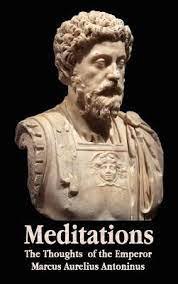
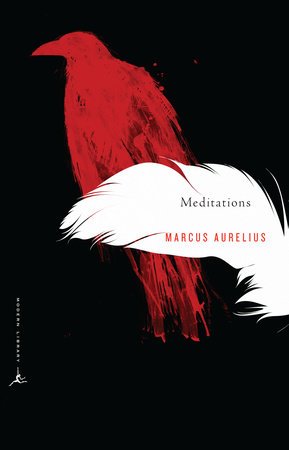
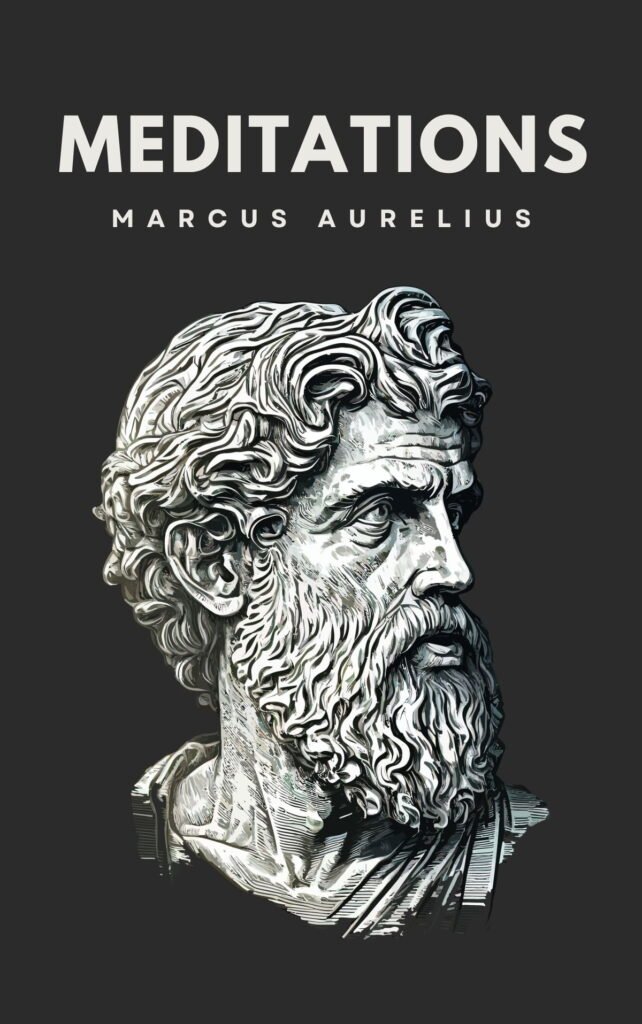
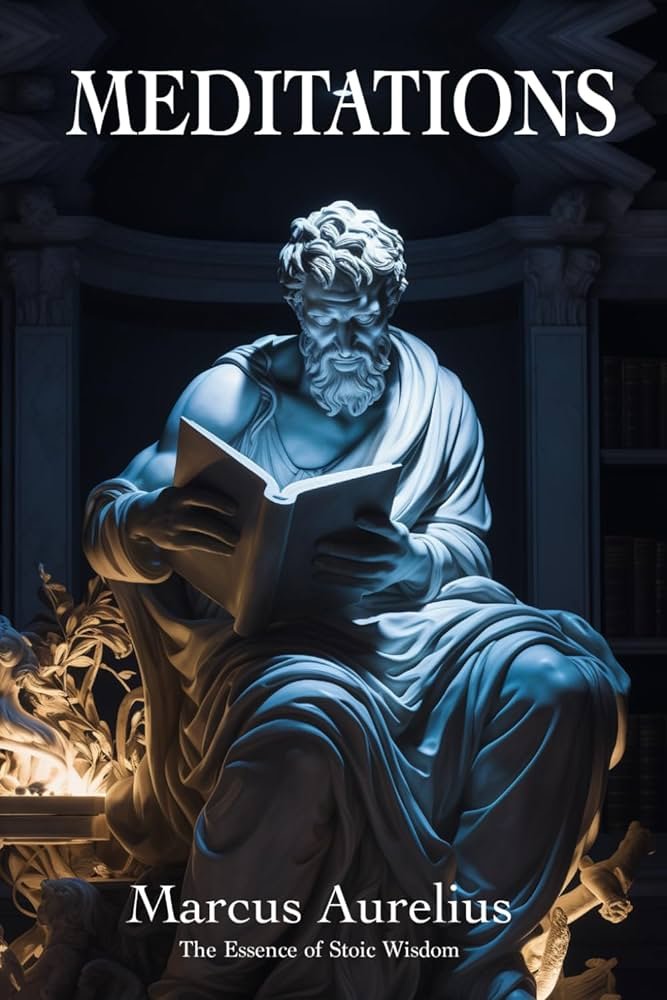
Understanding "Meditations"
The Creation of "Meditations"
Unlike other philosophical works, “Meditations” was not intended for publication. These deeply personal writings, crafted during Aurelius’s military campaigns, offer a unique glimpse into the mind of a ruler striving to live a virtuous life amidst the chaos of leadership and warfare.
The Nature of the Universe
Aurelius’s reflections on the universe’s nature highlight the Stoic belief in a rational, interconnected cosmos, urging individuals to live in harmony with this more significant order.
The Discipline of Desire
He frequently addresses the discipline of desire, advocating for a life free from the pursuit of pleasure and the fear of pain, focusing instead on the pursuit of virtue.
The Importance of Rationality
Rationality stands at the core of Stoic philosophy and Aurelius’s teachings. He champions reason as the path to virtue, inner peace, and understanding the world.
The Impact of "Meditations" on Modern Life
Reading "Meditations" for the First Time
For newcomers, “Meditations” can seem daunting. However, approaching it as a personal conversation with Aurelius can make its wisdom more accessible and relatable.
Incorporating Stoic Practices into Daily Life
Aurelius’s teachings offer practical methods for integrating Stoic principles into everyday life, encouraging a mindset of growth, resilience, and virtue.
Criticisms and Counterpoints
The Challenges of Stoicism in the Modern World
While Stoicism offers valuable insights, critics argue that its principles can sometimes seem detached from the emotional complexities of modern life.
Relevance and Accessibility of Ancient Philosophy
Some question the relevance of ancient texts in the digital age, yet “Meditations” continues to find new audiences, underscoring the timeless nature of its wisdom.

Let's Explore The Connection Between "Meditating" And "Meditations" by Marcus Aurelius
The connection between “meditating” as a practice and the book “Meditations” by Marcus Aurelius is both philosophical and practical, though perhaps not in the way one might initially think. “Meditating,” in a modern sense, often refers to engaging in deep thought or contemplation, sometimes involving specific techniques for mindfulness or concentration. The book “Meditations,” on the other hand, does not describe meditation practices as they’re understood today but is instead a collection of personal reflections, insights, and philosophical musings.
Philosophical Connection
At its core, the philosophy of Stoicism, which Marcus Aurelius adheres to in “Meditations,” promotes self-examination and reflection to live a virtuous and meaningful life. This self-examination aligns with the broader purpose of meditation today: to gain deeper insight into one’s thoughts, emotions, and the nature of existence.
Practicing Mindfulness and Reflection
Mindfulness: Modern meditation practices often emphasize mindfulness—the ability to be fully present and aware of where and what we do. Marcus Aurelius’s writings encourage mindfulness through constant self-reflection and awareness of one’s thoughts and actions by nature and reason.
Reflection: “Meditations” is fundamentally a book of reflections. It can be seen as Marcus Aurelius’s method of meditating on various aspects of life, including his roles as an emperor, a Stoic, and a human being. Writing down these reflections is a meditative practice, encouraging a deeper understanding of oneself and one’s place in the cosmos.
The Inner Dialogue
Meditation often involves an inner dialogue or a quieting of the mind to achieve greater clarity and peace. Similarly, “Meditations” represents Marcus Aurelius’s inner dialogue, where he challenges his perceptions, biases, and reactions to align them more closely with Stoic principles such as wisdom, courage, justice, and temperance.
Practical Application
Both meditation and the philosophical exercises found in “Meditations” serve as tools for personal growth and resilience. They offer ways to cope with stress, adversity, and the challenges of daily life by fostering a calm, composed mindset and a focus on what can be controlled.
In Summary
While “meditating” and the content of “Meditations” by Marcus Aurelius come from different historical and conceptual backgrounds, they converge on the importance of self-awareness, self-regulation, and the pursuit of wisdom. The practice of meditating can complement the philosophical insights found in “Meditations,” offering a practical approach to incorporating Stoic virtues into one’s life. Engaging with “Meditations” can thus be seen as a form of mental and ethical exercise, encouraging readers to reflect on their thoughts, actions, and the wider world, much like the broader practice of meditation seeks to do.
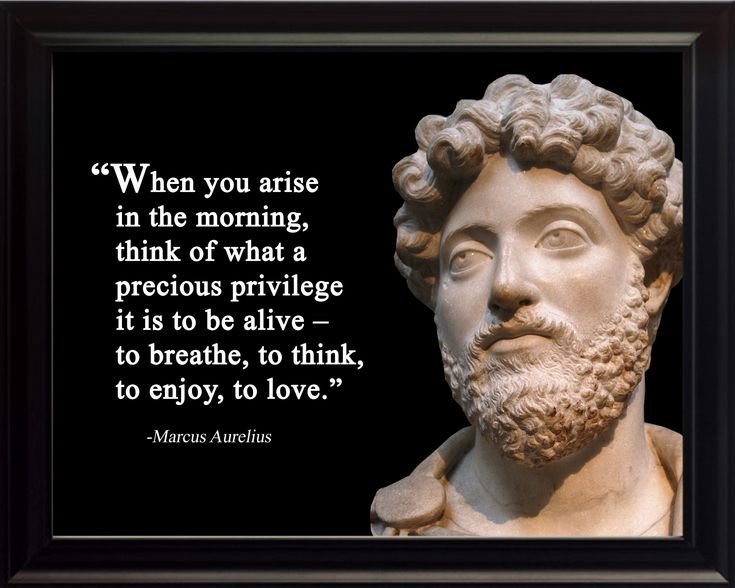
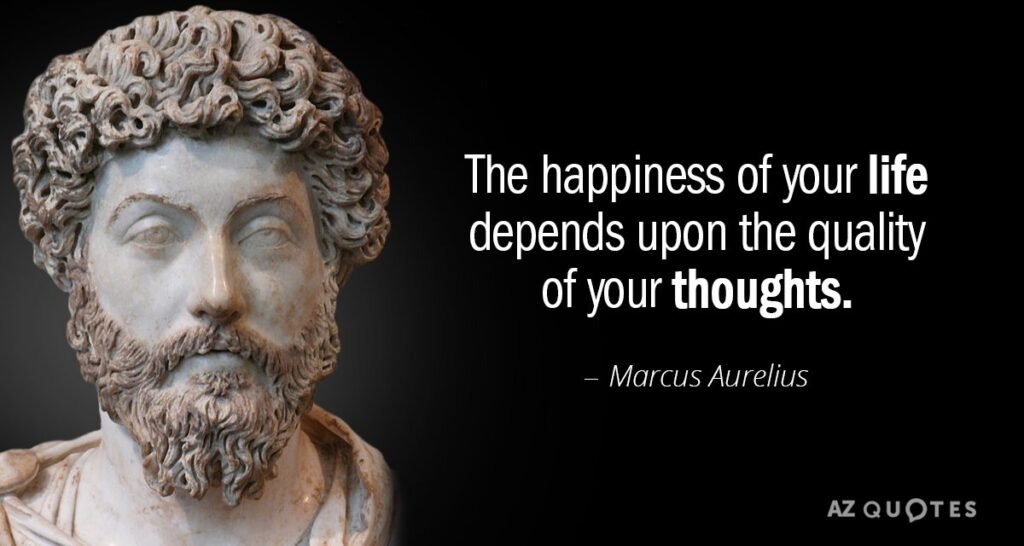
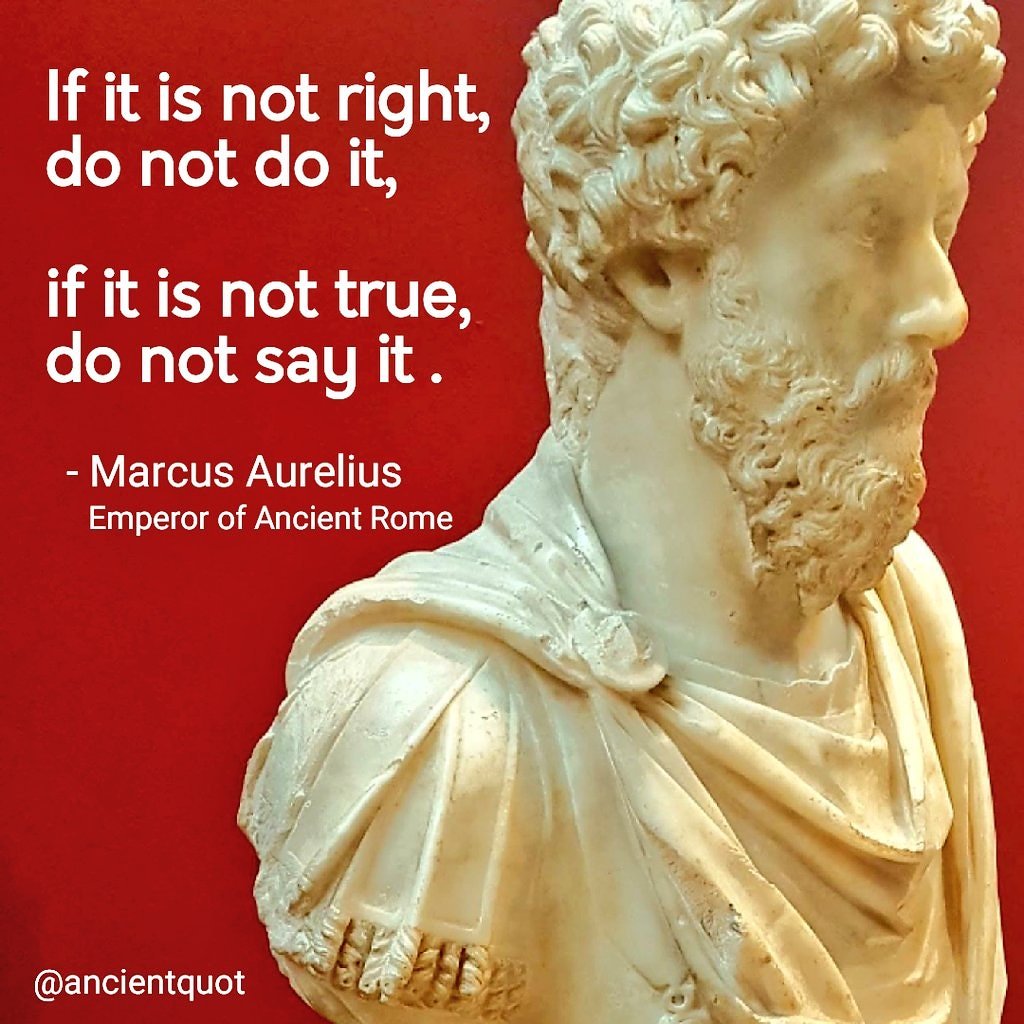

"Meditations" in Popular Culture
References in Books, Movies, and Media
“Meditations” has permeated popular culture, influencing a wide range of creative works and thought leaders, from authors to filmmakers.
Influence on Contemporary Thought Leaders
Many modern philosophers, psychologists, and self-help authors draw upon Aurelius’s work, proving its continued relevance in addressing life’s fundamental questions.
Final Thoughts
Marcus Aurelius’s “Meditations” offers a window into the soul of a philosopher-king and provides a timeless guide to living a meaningful life. Its lessons on virtue, resilience, and the nature of the universe continue to resonate, making it a vital read for anyone seeking wisdom and tranquility in tumultuous times.
Conclusion
“Meditations” by Marcus Aurelius stands as a monument of ancient philosophy and a beacon of wisdom for generations. Through its pages, Aurelius extends a hand across millennia, offering guidance, comfort, and insight into the human condition. Marcus Aurelius’s life and works serve as a testament to the enduring relevance of Stoic philosophy. His commitment to virtue, duty, and rationality amidst the trials of his reign offers timeless insights into the human condition. His legacy, encapsulated in “Meditations,” resonates with those seeking wisdom and tranquility in an ever-changing world.
Frequently Asked Questions
-
What makes “Meditations” relevant today? “Meditations” addresses universal themes of human existence—ethics, leadership, and personal growth—making its lessons timeless and universally applicable.
-
How can “Meditations” influence my daily life? By adopting Aurelius’s Stoic principles, you can cultivate a more resilient, virtuous, and reflective approach to life’s challenges and joys.
-
Is “Meditations” difficult to understand? While some passages may seem abstract or dense, many find its teachings profoundly relatable and its advice practical for everyday situations.
-
Why did Marcus Aurelius write “Meditations”? Aurelius penned “Meditations” as a personal journal, a means of self-reflection and a reminder of Stoic principles amidst the responsibilities of empire.
-
Can “Meditations” help me become a better leader? Absolutely. Aurelius’s insights into leadership, emphasizing humility, duty, and the common good, offer valuable lessons for leaders in any field.
About The Author
Zackery Dixon
administrator
Zackery N. Dixon, a seasoned web designer, entrepreneur, blogger, and proud U.S. Marine, has carved a remarkable path in the digital landscape. At 69, Zackery’s extensive experience and dedication have culminated in a fulfilling retirement, underscoring his notable achievements in the industry.
With a career spanning several decades, Zackery’s expertise in web design is reflected in the successful management of four diverse and dynamic websites. Each platform—First Digital Electronics, Law of Attraction Lab, Diet Exercise Pros, and Yoga Meditation Hub—demonstrates his commitment to delivering valuable content and innovative design.
